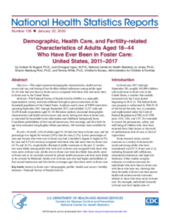Displaying 521 - 530 of 2223
This report presents demographic characteristics, health service access and use, and timing of key fertility-related milestones among adults aged 18–44 who had ever been in foster care as compared with those who had never been in foster care in the United States.
The purpose of the current study is to highlight the rates of suicidal ideation and behaviour in youth with out‐of‐home care experience, illuminating the empirical risk factors that may increase their vulnerability.
This study examined how foster parents worked together to parent foster children, how they described their roles and involvement with their foster children, how fostering impacted their coparenting and couple relationship, and their experiences and needs of working together with and within the foster care system.
Using Swedish longitudinal registry data for a national cohort sample of siblings, in which some were placed in foster care and others remained in their birth parents’ care, this study asks whether long-term foster care ensures improved life chances.
This study explored the impact of sociosexualization and sexual identity development on the sexual well-being of youth formerly in the foster care system.
This article aims to review briefly the broader social, historical, and structural contexts of mandated reporting and the linked phenomena of parenting surveillance and the forced separation of families of color in the U.S.
In the current study, the authors identify specific child protective service experiences and mental and behavioral health characteristics that are predictive of moving from a family based foster placement to a congregate care placement.
Inspired by Merton and Barber’s sociological theory on ambivalence, this article analyses ‘co-parenting’ between foster parents and birth parents as prototypes of ambivalent relationships; that is, relationships based on incompatible role requirements.
This article presents findings from a thematic analysis of interviews with 13 foster parents who participated in a mixed methods study exploring inclusive foster care in Canada - an approach requiring foster parents to engage with the family, community, and cultural life of the child for whom they care.
For this study, the researchers conducted a retrospective descriptive study of Medicaid files for 30 individuals placed in a foster care system that included an analysis of 10 consecutive visits with a prescribing practitioner spanning 8–14 months.

